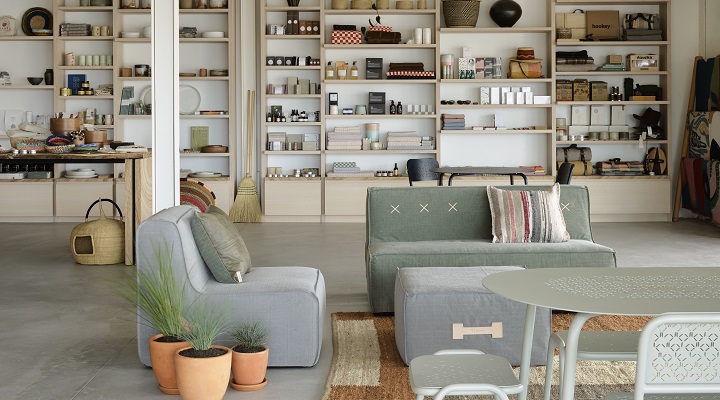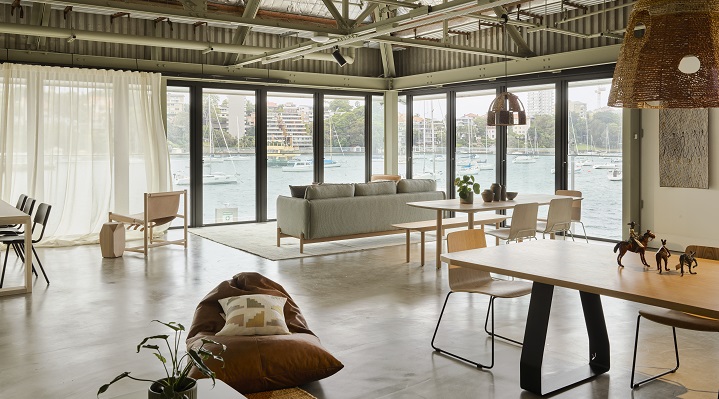
Iconic design brand Koskela has opened the doors to a stunning new concept store and headquarters on Sydney Harbour as part of a comprehensive brand refresh that includes a new website and virtual design service, as well as new product ranges for workplaces and schools.
Located in a former submarine base in North Sydney, the new store is half the size of the brand’s previous 1000sqm warehouse in Rosebery, but better suited to the needs of post-pandemic shoppers.
“Although Covid was difficult in many ways, it was actually a really good opportunity for us to be able to reimagine what our retail experience could be like,” Koskela co-founder Sasha Titchkosky, told Inside Retail.
“What we found was that having a 100-year-old warehouse space that relied on a lot of foot traffic to make it work didn’t really necessarily sell furniture in the best way. It was harder to interact with customers and harder to develop connections with them. It was harder to personalise things as well.”
At 500sqm, the new concept store, brought to life by Aspect Studio and lahznimmo architects, includes a dedicated space for one-on-one design consultations and showcases furniture, art, floor rugs and other homewares over two floors with breathtaking harbour views.
“It is smaller, but seems to accommodate everything,” Titchkosky said. “Our old store evolved over the 10 years we were there, whereas this time, we have been able to design it intentionally, and have a really nice display for all of the smaller products.”

Tapping into online shoppers
Founded in 2000 by Russel Koskela and Sasha Titchkosky, Koskela is known for making high-end furniture that stands the test of time – both in terms of durability and style. Its products are made in Australia, with a focus on natural materials.
Like many retailers, the brand was forced to rely on its e-commerce site to survive Covid lockdowns and it invested heavily in improving its online offer. Now that bricks-and-mortar stores are open again, it’s aiming to provide a seamless omnichannel shopping experience.
“Some customers are very happy to buy online without ever really having a physical experience with the brand, but most customers, I think, still want to see and touch things, especially furniture. They tend to be bigger purchases that are a reasonable spend for a household,” Titchkosky said.
“What we’re finding is that people might only need to visit once, and then they’re happy to complete the transaction online.”
The role of the store now is about building relationships with customers, educating them about the brand’s values and creating a memorable experience for them, Titchkosky says, and personal design consultations are a big part of that.
While Koskela offered this service in its previous store, there was no dedicated space for it. The new store has a comfortable space for customers to sit down with one of the brand’s design experts and consider different material and finish options, so they can make a more confident purchase decision.
“Ultimately, we want the customer to absolutely love what they buy from us, that’s the best outcome for us – and environmentally as well, because then people will hang on to [their furniture], and potentially come back and get them reupholstered or refinished, so it extends the life cycle of the product, which is really important to us,” Titchkosky said.
The brand also offers virtual design consultations for customers who can’t come into the store.
Embracing the circular economy
The new store is just one aspect of Koskela’s recent brand refresh, which was developed in collaboration with branding agency Frost*collective.
Citing a “new era” for the business, Koskela is launching new ranges for workplaces and schools in the coming months and, eventually, an online marketplace for pre-loved products.
“Rather than [Koskela] products ending up on Gumtree or something, where their value isn’t well-recognised, and there are potentially inauthentic products, we’re offering that [service] to our community,” Titchkosky said.
“If the product needs to be reupholstered, refinished, repaired, or upgraded, we could do that and offer it at a lower price. Some of our customers are super values-aligned [with us], but may not have the budget to afford all of our products.”
Titchkosky admires Patagonia’s belief that it is responsible for the entire lifecycle of its products, not the customer.
“Our objective is to make sure that anything we create is around for as long as possible. Ideally, we’d love for it to be considered a future heirloom,” she said.
Celebrating First Nations artists
One thing that isn’t changing is Koskela’s commitment to collaborating with First Nations artists. The brand first started selling products made by Indigenous artists in 2009 – a collection of pendant lamps woven by Yolngu weavers from Elcho Island off the coast of Arnhem Land – and they have been a core part of its offering ever since.
“After a three-year journey of trying to understand this weaving practice that had been done for thousands of years, we came together to open up a new marketplace,” Titchkosky recalled.
“We’ve now grown that collection to embrace different artists and art centre communities all around Australia, which is pretty exciting.”
She has been heartened to see the increased number of mainstream retailers collaborating with First Nations artists, however, she believes they should be long-term partnerships, rather than one-off collections.
“These people that fly in, fly out – I don’t think that that’s the way these collaborations should be positioned,” she said. “Often these collaborations tell really important cultural stories. They shouldn’t be something that’s just around for a season and then you move on to the next thing.”
The post Why Aussie design brand Koskela is rethinking the way it sells furniture appeared first on Inside Retail.

